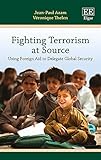Fighting terrorism at source : using foreign aid to delegate global security /
By: Azam, Jean-Paul
Title By: Thelen, Veronique
Material type: BookPublisher: Cheltenham : Edward Elgar, c2018.Description: vi, 194 p. : ill., maps ; 25 cm.ISBN: 9781786432162; 1786432161Subject(s): Terrorism -- Economic aspects | Terrorism -- Social aspectsDDC classification: 363.32517 AZ FI Online resources: Location Map
BookPublisher: Cheltenham : Edward Elgar, c2018.Description: vi, 194 p. : ill., maps ; 25 cm.ISBN: 9781786432162; 1786432161Subject(s): Terrorism -- Economic aspects | Terrorism -- Social aspectsDDC classification: 363.32517 AZ FI Online resources: Location Map | Item type | Home library | Call number | Status | Notes | Date due | Barcode | Item holds |
|---|---|---|---|---|---|---|---|
| REGULAR | University of Wollongong in Dubai Main Collection | 363.32517 AZ FI (Browse shelf) | Available | Oct2018 | T0060695 |
, Shelving location: Main Collection Close shelf browser

|

|

|

|

|

|

|
||
| 363.32509669 CO BO Boko Haram : | 363.32509669 PE HU The hunt for Boko Haram : | 363.32516 QU RU Rules of the game : | 363.32517 AZ FI Fighting terrorism at source : | 363.32517 LE CO Counterterrorism and cybersecurity : | 363.32517 LE CO Counterterrorism and cybersecurity : | 363.3255 CH NU Nuclear war and environmental catastrophe / |
Includes bibliographical references (pages 180-188) and index.
Contents: 1. Introduction and Overview Part 1: Getting the Questions Right 2: Targets and Perpetrators of Transnational Terrorist Attacks 3: Why Suicide Terrorists Get Educated 4: Aid and Military Intervention in a Model of Delegated Protection Part 2: Empirical Answers 5: Testing the Impacts of Foreign Aid and Military Interventions 6: Estimating the Speed of Terrorist Responses. 7: The Problem of Imported Attacks 8. General Conclusion Bibliography Index.
This book offers a unique and insightful econometric evaluation of the policies used to fight transnational terrorism between 1990 and 2014. It uses the tools of modern economics, game theory and structural econometrics to analyze the roles of foreign aid, educational capital, and military intervention. Jean-Paul Azam and Veronique Thelen analyze panel data over 25 years across 124 countries. They prove that foreign aid plays a key role in inducing recipient governments to protect the donors' political and economic interests within their sphere of influence. Demonstrating that countries endowed with better educational capital export fewer terrorist attacks, they also illustrate that, in contrast, military intervention is counter-productive in abating terrorism. Recognizing the strides taken by the Obama administration to increase the role of foreign aid and reduce the use of military interventions, this book shows the significant impact this has had in reducing the number of transnational terrorist attacks per source country, and suggests further developments in this vein. Practical and timely, this book will be of particular interest to students and scholars of economics and political science, as well as those working on the wider issue of terrorism. Presenting a series of new findings, the book will also appeal to international policy makers and government officials.
